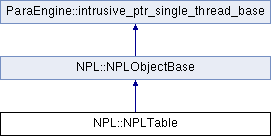this is a pure c++ implementation of lua table. More...
#include <NPLTable.h>
Inheritance diagram for NPL::NPLTable:

Public Member Functions | |
| NPLTable () | |
| this is an empty table | |
| void | ToString (std::string &str) |
| output table to serialized string. More... | |
| void | Clear () |
| clear the table object | |
| void | SetField (const string &sName, const NPLObjectProxy &pObject) |
| Set the field. More... | |
| void | SetField (int nIndex, const NPLObjectProxy &pObject) |
| NPLObjectProxy | GetField (const string &sName) |
| get a field. More... | |
| NPLObjectProxy | GetField (int nIndex) |
| NPLObjectProxy & | CreateGetField (const string &sName) |
| create or get a field. More... | |
| NPLObjectProxy & | CreateGetField (int nIndex) |
| Iterator_Type | begin () |
| Iterator_Type | end () |
| IndexIterator_Type | index_begin () |
| IndexIterator_Type | index_end () |
| NPLObjectProxy & | operator[] (const string &sName) |
| this will create get field. More... | |
| NPLObjectProxy & | operator[] (const char *sName) |
| NPLObjectProxy & | operator[] (int nIndex) |
 Public Member Functions inherited from NPL::NPLObjectBase Public Member Functions inherited from NPL::NPLObjectBase | |
| NPLObjectType | GetType () |
| bool | isTable () |
| bool | isNumber () |
| bool | isString () |
| bool | isNil () |
| bool | isBool () |
Additional Inherited Members | |
 Public Types inherited from NPL::NPLObjectBase Public Types inherited from NPL::NPLObjectBase | |
| enum | NPLObjectType { NPLObjectType_Nil, NPLObjectType_Table, NPLObjectType_Number, NPLObjectType_String, NPLObjectType_Bool } |
| typedef std::map< std::string, NPLObjectProxy > | TableFieldMap_Type |
| typedef std::map< int, NPLObjectProxy > | TableIntFieldMap_Type |
| typedef TableFieldMap_Type::iterator | Iterator_Type |
| typedef TableIntFieldMap_Type::iterator | IndexIterator_Type |
 Public Attributes inherited from ParaEngine::intrusive_ptr_single_thread_base Public Attributes inherited from ParaEngine::intrusive_ptr_single_thread_base | |
| long | m_ref_count |
 Protected Member Functions inherited from ParaEngine::intrusive_ptr_single_thread_base Protected Member Functions inherited from ParaEngine::intrusive_ptr_single_thread_base | |
| intrusive_ptr_single_thread_base (const intrusive_ptr_single_thread_base &) | |
| intrusive_ptr_single_thread_base & | operator= (const intrusive_ptr_single_thread_base &) |
 Protected Attributes inherited from NPL::NPLObjectBase Protected Attributes inherited from NPL::NPLObjectBase | |
| NPLObjectType | m_type |
Detailed Description
this is a pure c++ implementation of lua table.
it can convert back and force from string. only data members are supported. This class is mostly used by C++ plugin modules.
- Remarks
- : Use NPLObjectProxy instead of this class. Example: Example 1: Create NPLTable and serialize to string NPL::NPLObjectProxy msg; msg["nid"] = (double)10; msg["name"] = "value"; msg["tab"]["name1"] = "value1"; NPL::NPLHelper::SerializeNPLTableToString(NULL, msg, strOutput);
Example 2: deserialize NPLTable from string.
NPL::NPLObjectProxy tabMsg = NPL::NPLHelper::StringToNPLTable("{nid=10, name=\"value\", tab={name1=\"value1\"}}");
PE_ASSERT((double)tabMsg["nid"] == 10);
PE_ASSERT((tabMsg["name"]) == "value");
PE_ASSERT((tabMsg["tab"]["name1"]) == "value1");
@note: no cyclic link is allowed. Member Function Documentation
§ CreateGetField()
| NPLObjectProxy & NPLTable::CreateGetField | ( | const string & | sName | ) |
create or get a field.
It may return null proxy
§ GetField()
| NPLObjectProxy NPLTable::GetField | ( | const string & | sName | ) |
get a field.
It may return null if not found.
§ operator[]()
|
inline |
this will create get field.
§ SetField()
| void NPLTable::SetField | ( | const string & | sName, |
| const NPLObjectProxy & | pObject | ||
| ) |
Set the field.
- Parameters
-
sName the field name pObject if NULL, it will remove the field, as if nil in lua.
§ ToString()
| void NPLTable::ToString | ( | std::string & | str | ) |
output table to serialized string.
The documentation for this class was generated from the following files:
- Client/trunk/ParaEngineClient/NPL/NPLTable.h
- Client/trunk/ParaEngineClient/NPL/NPLTable.cpp
 1.8.12
1.8.12